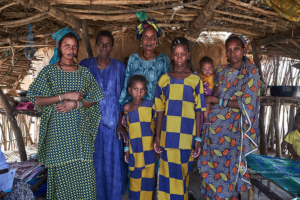Ongoing Efforts Focused on Improving Women’s Rights in Mauritania
 According to Georgetown’s 2021-2022 Women, Peace and Security Index, Mauritania is the 14th worst country for women to live in. Lying below the southern border of Morocco in the northwest of Africa, Mauritania is deeply conservative and one of the poorest nations on earth. Currently, 56.9% of its residents live in multi-dimensional poverty. The country’s laws designate men as the head of households, structurally relegating women to domestic roles and leaving them with limited opportunities to improve their economic situation. Sharia law and cultural influences have entrenched gender-based discrimination in Mauritania. Nevertheless, there is hope, as the treatment of women has seen some gradual improvements.
According to Georgetown’s 2021-2022 Women, Peace and Security Index, Mauritania is the 14th worst country for women to live in. Lying below the southern border of Morocco in the northwest of Africa, Mauritania is deeply conservative and one of the poorest nations on earth. Currently, 56.9% of its residents live in multi-dimensional poverty. The country’s laws designate men as the head of households, structurally relegating women to domestic roles and leaving them with limited opportunities to improve their economic situation. Sharia law and cultural influences have entrenched gender-based discrimination in Mauritania. Nevertheless, there is hope, as the treatment of women has seen some gradual improvements.
Combatting Sexual and Physical Violence Against Women
Mauritania alarmingly accepts sexual and physical violence against women both socially and institutionally. The country’s governance by Sharia law leads to severe punishment for “Zina,” or sex outside of marriage. The high burden of evidence required to prove rape makes women hesitant to report their assaults, fearing legal punishment for engaging in intercourse if the state fails to prosecute the attacker. Consequently, only about 20% of rape cases are reported, as per the findings of the Social Welfare Ministry. Besides the moral implications of widespread rape, the trauma of sexual assault significantly hinders women’s independence and economic well-being in the long run.
Moreover, Mauritania often tolerates domestic violence without prosecution, and this contributes to perpetuating poverty. A study by the International Monetary Fund (IMF) revealed that a mere 1% increase in female victimhood from domestic violence corresponds to a 9% drop in economic activity. Although legislation urgently addresses these injustices, progress has been slow. Despite activists’ efforts leading to the government passing the Law Against Violence Against Women and Girls, it was never certified by parliament. In the meantime, NGOs like the “Association of Women Heads of Households” (AFCF), founded by women’s rights activist Aminetou Mint El-Moctar in 1999, provide crucial support to women by intervening in cases of sexual assault and assisting them in pressing charges.
Creating Economic Opportunities for Women
Addressing gender disparities in economic opportunities is essential for empowering Mauritanian women. The country’s rank as sixth worst in the world, according to the Women’s Workplace Equality Index, underscores the urgent need for action. Several potent barriers to economic equality exist, including differences in wages, limitations on land rights, restricted opportunities for specific jobs, social stigma and the absence of legal authority to be heads of households.
Although some laws exist to address these issues, the government often has limited control over local rule. Consequently, the female labor participation rate was a mere 26% in 2022 compared to 57% for men. Women who do have jobs often occupy informal domestic positions without formal arrangements and social protections, making them highly vulnerable to falling into poverty. Unfortunately, up to 20% of the population remains enslaved.
In recent years, the government has taken steps to address these issues, such as promoting female political representation, expanding job opportunities, investing in education and cracking down on slavery. A national multi-party platform involving local authorities and NGOs was established to help enforce federal laws, particularly concerning land rights. However, external observers, including the World Bank, argue that Mauritania must focus on achieving legal gender equality through comprehensive systemic reforms.
Confronting Forced Child Marriage
Gender inequality in marriage is another significant concern in Mauritania, with 37% of girls going into marriage before their 18th birthday. Some communities even resort to force-feeding girls to make them appear more sexually mature at a younger age. Early and forced marriages seriously undermine women’s rights and economic potential in Mauritania. While cultural norms play a critical role in perpetuating this practice, poverty also motivates women to marry early.
The Mauritanian government has pledged to end forced child marriage within the next decade, collaborating with UNICEF to enact legislative and judicial reforms and conduct education campaigns against the practice. For instance, UNICEF worked with local imams to create religious arguments supporting children’s rights.
Additionally, the government has implemented programs like the Sahel Women Empowerment and Demographic Dividend (SWEDD) to empower girls to stay in school, as pregnancy is a significant barrier to girls’ education prospects in Mauritania. Nevertheless, human rights organizations, including Human Rights Watch, insist that there is a need for legislation establishing a minimum age for marriage in line with international standards and giving women the legal right to refuse marriage. Moreover, despite being technically illegal in Mauritania, child marriage remains permissible with parental and judicial consent.
Conclusion
Despite the challenges Mauritania faces regarding gender inequality, there is hope for positive change. Activists and NGOs like AFCF provide support to women facing violence and discrimination, while the government has taken steps to promote female political representation and expand job opportunities. Collaborating with UNICEF, Mauritania aims to end forced child marriage and empower girls to stay in school through programs like SWEDD. Although progress may be gradual, these efforts signal a growing commitment to improving the lives and economic prospects of Mauritanian women.
– David Newman
Photo: Flickr
